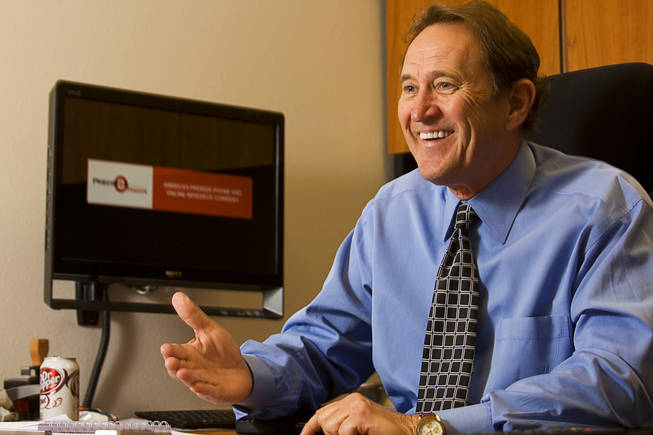
Jim Medick, president of Precision Opinion, responds to a question during an interview in his research and polling office Aug. 26, 2010. He recently hired more than 100 new employees.
Saturday, Sept. 11, 2010 | 2 a.m.
ANSWERS, PLEASE
Precision Opinion has nearly 300 interviewers working at its Convention Center Boulevard office. About 120 of them have been hired in the past year. The company’s business is booming, owner Jim Medick says, and he expects to hire another 120 poll takers to keep up with the demand.
Sun coverage
On the ground floor of a nondescript office tower in the Strip’s shadow, a room crammed with cubicles is coming to life.
It’s nearly 2 p.m., the end of the work day on the East Coast. Time for hundreds of pollsters to hit the phones and take the pulse, rolling east to west, of a nation.
A soft rumble builds. Polite voices tiptoe into questions about the economy and movie-watching.
“Have you seen a movie in the past year?” a man nearby asks, reading a screen programmed to prompt an array of follow-up questions based on each response. “Do you own any DVDs or Blu-ray discs?”
The nearly 300 survey-takers at market research firm Precision Opinion are an undercover fixture in a town where casinos predict gambling profits, develop attractions and tweak promotions based on fine-tuned mathematical formulas and well-studied case histories of consumer behavior.
Precision Opinion surveys have played an important, though little-known, role in the development of major entertainment attractions and gambling offerings in the casinos of Las Vegas and beyond. Company surveys have given casino bosses some confidence that, for example, Mandalay Bay’s “Lion King” show or Shark Reef aquarium will appeal to visitors. Or that customers will gamble or otherwise spend money at the Venetian after exiting its “Phantom of the Opera” production.
After nearly two decades in the polling business, owner Jim Medick now works for a roster of bigwigs that extends well beyond the casino industry and belies his mundane location in a dated building next to the former Greek Isles casino.
Polls conducted in Precision Opinion’s Convention Center Drive offices two years ago concluded that “The Expendables” — a movie starring an ensemble of silver screen veterans including Sylvester Stallone — would appeal to a broader audience than the typical shoot-’em-up. Interviewers queried whether actor Robert Downey Jr. was an appropriate lead for “Iron Man” and whether audiences would appreciate the 3-D effects of the big-budget “Avatar,” along with — or perhaps despite — its layered plot.
Major Hollywood studios have pored over the company’s survey results for a decade, leaving little in the life cycle of a movie — including plot lines, endings, choice of actors, promotional trailers and even DVD cover art — to chance.
The movie industry isn’t even the Las Vegas company’s biggest celebrity client. Every week, Precision Opinion polls the country’s attitudes on the economy, political parties and candidates for the Obama administration and White House pollster Joel Benenson.
Political questions are harder to suss out amid movie-related chatter — save for a single, repeated word — economy — that laps the room like waves on a beach. It’s the No. 1 issue in America, after all — and it’s not a bad word in this particular office.
While other local businesses struggle to hang on in a depressed, tourism-driven economy, Medick — an outgoing man with a quick laugh and a keen sense of irony — has the opposite problem.
“We’re absolutely hammered with work,” he says from a compact office that opens to the polling floor. A spreadsheet reveals the depth of his predicament: At a pace of at least two, 15-minute surveys per interviewer per hour, including time spent culling usable interviews, today’s 1 to 9 p.m. shift must score several hundred interviews across 14 surveys. Medick is about 40 people short of the 340 interviewers he needs to comfortably meet today’s quota.
Medick has hired about 120 interviewers over the past year but says he needs another 120 people to keep up with a steady increase in business. His office conducted hundreds of thousands of interviews last year — volume that could double this year.
“The worse the economy gets, the better business is for me because people need to figure out what to do about it,” he says. “No matter what side of the political fence you’re on, no matter what candidacy you run, you need to know.”
Polling work for the White House has spiked and will heat up in the weeks leading up to the midterm elections, as the Obama administration assists political campaigns and gauges public sentiment across the country. After slowing around election time, business will pick up again, well in advance of the 2012 presidential race and federal and state elections. The presidential election season will start earlier and run longer, he predicts.
“This is a unique time. I’ve never seen people more divided than they are now. The challenge (for government) is how to bring people together and find common ground.”
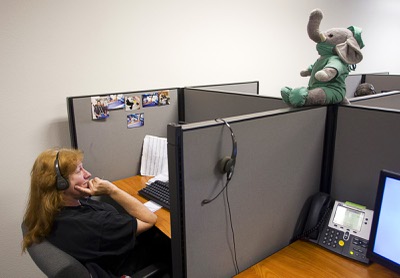
Interviewer Susan Jaeger makes a call at Precision Opinion, a research and polling office, on Aug. 26, 2010. The stuffed elephant sitting on the cubical identifies her as one of the top producers of the hour. The company recently hired more than 100 new employees, said Jim Medick, president of Precision Opinion.
Medick’s role as a go-to pollster for insiders in Washington and Hollywood began auspiciously, in the marketing departments of Procter & Gamble and Mattel.
As a brand manager for such products as Zest and Downy, Medick helped promote soap, laundry and household cleaning products to the American public. He later ran theme parks and the Ringling Bros. and Barnum & Bailey Circus for toy giant Mattel. Medick and another Mattel executive left to start a consulting business in the leafy, academic environs of Princeton, N.J.
He soon landed his first casino customer — the Showboat in Atlantic City.
A homegrown industry with underground origins, casinos were relatively unsophisticated about market research in the early 1990s, a turning point when casinos were starting to spread beyond Las Vegas and Atlantic City. Managers were historically promoted up from the casino floor and were more familiar with the mechanics of gambling than the nuances of marketing. Medick saw a rich vein and tapped it.
“I got a lot of, ‘Well, son, I’ve been in the business a long time and my gut can tell you what to do here,’ ” he says. But his research polls of casino customers and potential visitors, he says, spoke for themselves.
James Nickerson calls Medick a “pioneer” in market research for casinos.
“There was opinion but no scientific analysis” in the early days, says Nickerson, who worked with Medick as a project manager for Showboat in the late 1980s. “He has taken it to another level.”
In 2001 Nickerson helped launch WhiteSand Consulting, a company that conducts telephone polls and focus group tests of casino promotions, restaurant concepts and entertainment. Nickerson’s company, which hired another market research expert from Princeton to burnish its analytical credibility among the casino set, no longer considers Medick direct competition as his former colleague has moved into political and Hollywood polling.
“The industry is much more competitive, so they have to be more scientific” in their decision-making, Nickerson says of casinos. “After a show lets out, I can track what games people are playing and whether it’s worth what the casino is paying” the entertainer.
“The gaming guys test everything nowadays,” Medick adds. “There’s too much money involved now not to.”
After a few years traveling to and from Las Vegas to see casino clients, Medick relocated his market research company here in 1996. Moving from Ivy League surroundings to a so-called academic wasteland was a calculated gamble that has paid off many times over.
“Everyone thought I was nuts,” he says. “But I’ve won many a contract just because I live in Las Vegas.”
His Strip-adjacent offices proved a big selling point for both corporate and government clients who were fascinated by gambling and Las Vegas’ latest generation of luxury resorts. Some potential clients, he says, can’t wait to set up a meet-and-greet.
“I’ll say, ‘I’ll come see you’ and they say, ‘No, Jim, we’ll come see you. How’s that (resort) coming along, by the way?’ ”
Not surprisingly, politicians were among those interested in the growth of Las Vegas. Industry giants seeking to expand their sales nationwide hosted members of Congress at their properties and gave generously to political parties.
Nevada Sen. Harry Reid’s rising prominence in Congress over the past decade helped the gaming industry’s public relations campaign in Congress, which included fundraisers and social networking events in Las Vegas.
“In his efforts to solidify Las Vegas as a gaming mecca, Reid brought a lot of people here to show off the town,” Medick says. Casino customers showed off his research polls on the business potential of Las Vegas to politicians who were eager for reliable data of their own.
In the late 1990s, Medick made his biggest score: A contract with pollster Mark Penn during President Bill Clinton’s second term.
When Penn moved on to run Hillary Clinton’s presidential campaign, Medick picked up work for then Sen. Obama’s campaign.
Medick had once again crossed a threshold, welcomed into an esoteric world of obscure methods and insider meaning.
“There’s a lot of vetting and background checks,” he says. “They have to make sure you’re not the guy who’s going to get them in trouble. And their polls have to be really pristine. Once you have a track record, people feel comfortable working with you.”
Framed photographs on his office wall show Medick shaking hands with a who’s who of politicians, including Bill Clinton and Margaret Thatcher. It’s a fraction of his collection; others, including a photo with Ronald Reagan, are being cleaned and reframed.
The cradle-to-grave process of big-budget moviemaking isn’t hugely different from political campaigning. Both involve emotion, market share and an unrelenting life cycle approaching two years.
A research firm in Hollywood came knocking in 1999 and invited Medick to gauge the buzz surrounding a series of big-budget movies. Medick plugged poll results into an algorithm to come up with an estimate of how many millions of dollars each movie would make at the box office. His estimate was closer to actual results than a competitor’s, earning him the contract, Medick says.
Medick’s polling is prized by major studios, says Henry Shapiro, general manager of Los Angeles marketing research firm MarketCast.
“Information from every interview is precious. We won’t entrust that to just anybody,” says Shapiro, whose firm works for most of the Hollywood studios and includes the industry publication Variety among its sister assets. “Research is used not to replace the gut instinct and experience of a movie marketing executive but to inform it and help them manage risk and identify (business) opportunities.”
Unlike gambling, moviegoing has been resilient in the recession as movies “give people a sense of community” in times of stress and strife, just as they did during the Great Depression, he says. Likewise, the recession has been good for public sector polling, as the White House seeks counsel on governing a country in crisis. Other government clients including the Centers for Disease Control and Prevention, Food and Drug Administration and FBI are clamoring for research identifying risks and trends that can help them allocate scarce resources for social services such as medical care and law enforcement, Medick says.
The physical and mental health of a nation suffers in times of economic decline, creating a profitable outlet for compelling entertainment, he says.
This leads to a gripe about casinos, which now represent 10 percent of his business after recession-fueled budget cuts.
In particular, Las Vegas resorts aren’t doing enough to promote their individual identities, he says. Instead, they are relying on Las Vegas brand advertising and flooding customers’ mailboxes with direct mail that “preaches to the choir.”
“While they’re harvesting today’s crop, somebody’s got to be planting seeds in the next field because this (economy) won’t last forever. They’re making a critical mistake by not reaching out to new customers or convincing those on the fence that their property is better than the next one.”
In other words, they could learn a lesson or two from Hollywood — which exhaustively tests each film for crossover appeal and maximum profit.
A self-serving answer, perhaps?
Not in Medick’s world.
“We’ve done a lot of research on this,” he says.
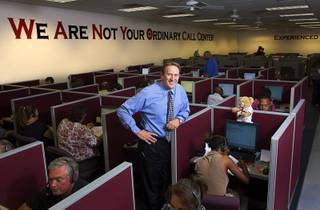
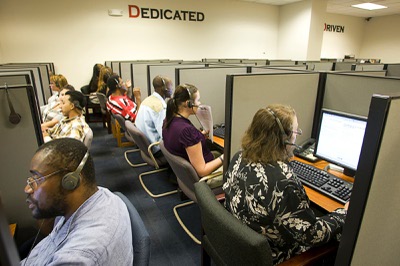
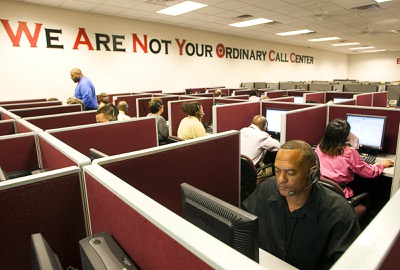
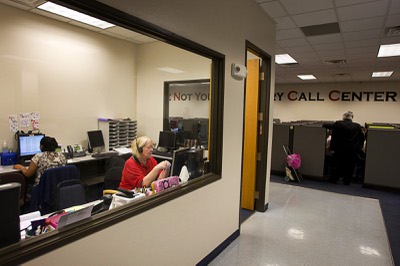

Join the Discussion:
Check this out for a full explanation of our conversion to the LiveFyre commenting system and instructions on how to sign up for an account.
Full comments policy